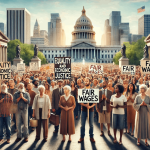John E. Jacob
The Need for Education and Job Training for Marginalized Communities
- Home
- >
- The Need for Education and Job Training for Marginalized Communities

Education is a basic right for everyone, but for many people in marginalized communities, getting a quality education is a challenge. There are many reasons for this, including long-standing issues like poverty, discrimination, and political problems. Solving these issues is not only the right thing to do, but it is also crucial for progress and fairness in the world. This article will explore the obstacles to education in marginalized communities and look at some of the new ideas helping to create better access to education for everyone.
For people in poor and marginalized areas, where discrimination and exclusion are common, education can be a lifeline. It helps individuals gain the skills and knowledge needed to improve their lives, participate in society, and contribute to the growth of their communities. Education is also key in promoting gender equality, reducing child mortality, and improving health.
In his book I Will F.E.A.R No Evil, John E. Jacob reflects on an important period in U.S. history, discussing the lost opportunities during the Reagan and Bush administrations in the 1980s and early 1990s. As President and CEO of the National Urban League, Jacob highlighted the urgent need for education and job training to prepare marginalized communities for the challenges of the future. The League, along with other progressive groups, opposed key policies from the Reagan era, winning important victories such as making Martin Luther King Jr. Day a national holiday and taking a strong stance against apartheid in South Africa. These actions helped build political activism in Black communities, which contributed to later successes like the elections of Bill Clinton and Barack Obama.
John Jacob’s personal story shows how education and perseverance can change lives. Growing up in a small, poor house with no electricity, he faced huge obstacles. But his parents taught him the value of education, hard work, and standing up for what’s right. These lessons helped him overcome hardships and become a leader of great influence. From walking miles to school because the bus wouldn’t take Black kids, to earning a scholarship that opened doors he never thought possible, John’s journey is a story of determination against the odds. He eventually became the President and CEO of the National Urban League, where he led efforts for equality and opportunity during some of America’s toughest times.
John Jacob’s story isn’t just one of personal success; it’s a reminder that no matter where you start, you can achieve great things if you have the will to keep going. His life shows the power of rising above challenges and helping others along the way. His journey proves that greatness isn’t about your beginning, but about how far you’re willing to go and the people you help along the way.
John E. Jacob
A former President and CEO of the National Urban League, committed to racial equality and leadership in both the public and private sectors.

